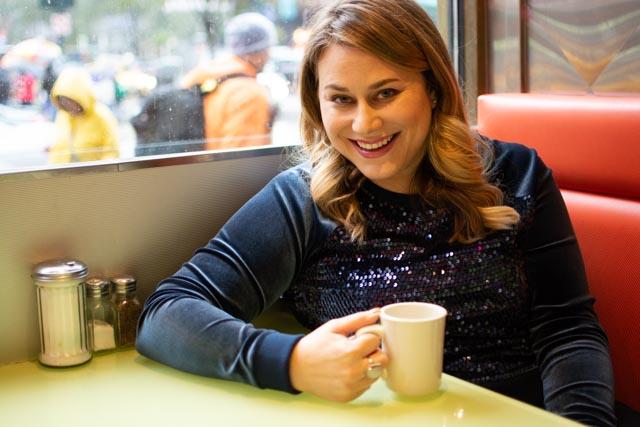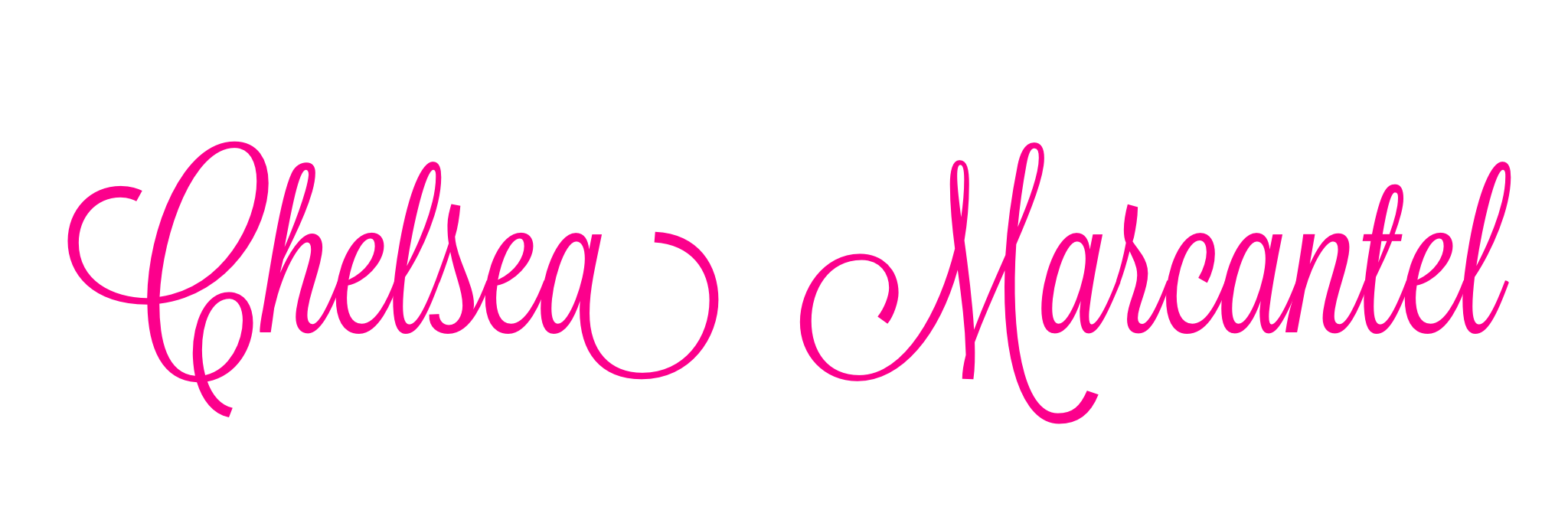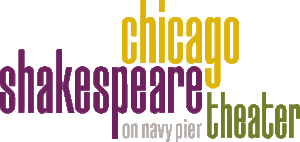
From Peter: My last project in graduate school was doing a small reading presentation of a scene from Airness by Chelsea Marcantel. It was the play EVERYONE was doing and had the theatre community buzzing. I remember walking up and down the halls reading this play in the halls where I had read so many plays. But none like this one. I found myself completely swept up in a world, while simultaneously baffled by who would know so much about this incredibly niche, and slightly odd, culture. What I did know: this playwright was different. And I thought she was a badass.
Almost a year to the day later, I found myself rehearsing the world premiere of Chelsea’s play, Tiny Houses, about the niche world of, you guessed it, the folks who live in tiny houses. Chelsea’s ability to tell the stories of niche interests, subcultures, or, as she calls it, small-group primates is unparalleled. She writes plays that are so hyper specific they tap into the universal truths. They are funny, the are thoughtful, and, maybe above all, they are uniquely human.
Beyond that, my suspicions were confirmed. She is, indeed, a badass. Her knowledge is infinite, her humor is contagious, and her heart is pure gold. She has talent, creativity, depth and a journey that’s already in our lore of “greatests”. We look up to her a lot and we’re thankful she donated her time, voice, humor, and wisdom to this little thing. They say never meet your heroes, so… Maybe they’re right.
Never meet your heroes.*
*Unless one of your heroes is Chelsea Marcantel.
Her agent pitches her as “The Queen of subcultures”. We pitch her as our favorite playwright. Chelsea, introduce yourself! And I think I speak for all of us when I say “geaux” for it!
I’m rolling my eyes REAL HARD at that “geaux” comment, Peter. But I guess that’s as good a way as any to bring up the fact that I was born and raised in Louisiana. I then moved to Chicago, Virginia, and New York, before ending up in Los Angeles (which I LOVE SO MUCH) in 2018. Along the way I accumulated degrees from LSU and The Juilliard School, myriad awesome friends, a couple of great agents, and a super cool sound designer/composer named Miles, who I married in 2011.
Talk to us about the journey of a young playwright pre-Juilliard. You moved to Chicago for 6 years before teaching college in Virginia. What’s the hardest part of amassing work as an unknown playwright? Is that woman trying to get to Juilliard or did she have other plans?
I’m so glad that I moved to Chicago right after I went to grad school (the first time). I think if I’d move to New York or Los Angeles right off the bat, I would’ve run home with my tail between my legs. But the theatre scene in Chicago is so open, so welcoming – if you’re willing to go as hard as you can for no money, you can work all the time and make the best plays and friends anywhere. When I lived in Chicago, people started doing my plays, almost from the beginning (mostly short plays in festivals, to start). It wasn’t until I’d been working constantly there for a handful of years that I realized that there wasn’t really a path forward for any of my plays – I didn’t have an agent, I wasn’t getting paid, nothing was getting published, nothing was getting a second production anywhere outside Chicago. I also had to hold down a 9-5 job all the time, which made me feel like I was dedicating the dregs of my time and energy to this thing that was supposed to be my real career. I was really stuck. I knew I needed to make a big move. Juilliard wasn’t even on my radar at that point, but I knew something had to change. Coincidentally, these feelings coincided with my getting engaged, and my then-fiancé getting a job at a regional theatre in Virginia. I didn’t know how that would impact my career, but I did know I’d have more time to write in Virginia than I did in Chicago, and that seemed like enough of a reason to go for it. It was while we were living there, and I took a breath and a break after years of never stopping long enough to really evaluate my trajectory, that I applied to Juilliard.
Whether you’re writing about air-guitar competitions, tiny house dwellers, magicians, sex workers or the Amish community; you’ve identified yourself as a “small-group primate writer”. How did you find that voice? Did you ever write in voices that didn’t work for you?
I wrote in voices that weren’t mine a lot. I think that’s the only way to find the authentic voice that DOES feel like you. I’d read a play by Tom Stoppard or Sarah Ruhl, and fall in love with it, and think, “Okay, that’s exceptional writing. My writing should sound more like that, and then it will be exceptional.” It’s a recipe for disaster, but I feel like everyone has to try out that weird ventriloquism act for a while in order to uncover the things that can be incorporated into your own voice in a non-creepy way. From Tom Stoppard, I got permission for explication, to make the audience feel like they’re as smart as the characters. From Sarah Ruhl, I got permission to be unapologetically feminine, and love all my characters beyond reason. I don’t sound like either one of them, but I can see the traces of the impact they and many other writers have had on me.
I didn’t define my voice until I got to Juilliard. There’s a big push there to be able to succinctly talk about “your stuff,” which is important for all the millions of meetings you’ll have pitching yourself for jobs. It’s something I hadn’t thought about much – I just wrote about things I found cool or upsetting or fascinating. When I started trying to define “my stuff,” my first guess was that I liked writing about power. But the more I looked at the line that connected my plays, and the line that connected the process of writing them, I realized that what I’m really drawn to is research, and subsequently writing about groups of Americans who have their own value system that is more important to them than mainstream culture. What happens when a person wants to get into or out of one of those groups, or the value system comes up against something it’s not prepared for? That’s interesting to me. I get a lot of inspiration from podcasts, articles, documentaries. I get these brain tickles that won’t leave me alone, and I start to do more research, and sometimes a human story emerges that I really want to write, and sometimes I just learn a ton of facts about some weird thing, that I then blast at people at parties.
Did you ever feel like giving up? If so, what got you through that time?
Um, let’s be real. I feel like giving up ALL THE TIME. This is not a sane business. This is not a safe business. I think if I’d had a child by now, I would have given up. I think if I didn’t have the familial safety net that I have (meaning, I’ve never worried I’d be evicted or have to have an operation that I couldn’t pay for), I would have given up by now. It’s always feast or famine as a playwright – either you take on more work than you can possibly do, to keep the lights on, or you can’t get anyone to pay attention to you at all. The thing that keeps me going is that I have a very deep belief that I’m really good at what I do, and I have something to contribute to the human conversation. Plus, come on, NOTHING is better than being in a rehearsal room. I get to do that just often enough that it keeps me coming back for more. I also have a family, a husband, friends, mentors, who believe in me. Having that support system is invaluable, but it wouldn’t do any good if I didn’t have a really unshakeable belief in my own abilities.
You’ve been a member of The Kilroys since 2018, a badass group that develops ‘The List’. ‘The List’, for those that don’t know, includes the results of [an] annual industry survey of excellent new plays by women, trans, and non-binary playwrights. It is a tool for producers committed to ending the systematic underrepresentation of women, trans, and non-binary playwrights in the American theater. Personally or professionally, what’s been the biggest lesson you’ve learned being a part of that community?
Being part of The Kilroys has been a life-changing experience. It’s an anarchist feminist collective, which means that there is no “leader,” and everything is put through the crucible of group discussion before it’s pushed out into the world. I’ve learned to be an organizer and an activist, and to do that I have had to confront my own implicit biases and blindspots (a middle-class white southerner), which has been humbling and invigorating. Doing activism in this way – a way that’s positive, increases community, and gives a signal boost to women, trans, and nonbinary writers – is both a ton of work, and a dream come true. On a purely selfish note, it also gave me a handful of great relationships ready-made when I got to LA, which was exciting and comforting.
You’ve started branching into the world of TV and musical theatre. What changes from medium to medium? What stays the same?
What stays the same is that everybody thinks they know what they want but they don’t. In all media, producers/directors/execs think they’re looking for something specific, but when they read something really good, they want that good thing. And everyone defines that “good thing” differently! Upshot: there’s no point in trying to chase the market. You just have to write what you want to write, and then hope you or your agent/manager can get it into the hands of someone who gels with it. TV used to be a lot more rigid, but now, it’s kind of anything goes, which is great for a playwright. Musicals are fun and tricky. They’re like plays where the monologues are sung. And you work on them for seven years, with other people. Both TV and musicals are A LOT more back-and-forth than I was used to, when I was sitting alone for hours at my computer working on my own. But I love collaborating, and I love that I stand to make a living wage since I started branching out.
Truth bomb! Even Tony Kushner said it years ago – no one makes a living in America as a playwright. You need to write screenplays, or TV, or act on a commercial level, or teach, or be married to someone with a really good job. I think this is something that doesn’t get talked about a lot, or like, ever, and I just want to say it whenever I can. The real patrons of the American arts are the parents and spouses and relatives and employers who help out with bills and schedule flexible hours and provide free childcare and do all the things that enable artists to keep working. Those people never end up with their names on the sides of buildings, they may not even LIKE theatre! So I want to give those folks a shout-out! I see you! THANK YOU, UNSUNG HEROES OF THE AMERICAN THEATRE!
Where are you on your mountain?
The funny thing is, I’m in a great place on the theatre side of the mountain. It’s just not what I thought it would be from the bottom. I try to constantly remind myself that I currently have most of the things I’ve always wanted – published plays, awards, great relationships with artistic directors, the best agents, and the time and resources to work on what I want to work on, most of the time. I just thought that, at some point, I’d… have time to take a breath? But the mountain is always a slippery slope and the hustle is real. I spend as much time trying to get jobs as I do writing. And I know I’m in a privileged position, that younger me is screaming, “ARE YOU REALLY COMPLAINING THAT TOO MANY PEOPLE WANT TO MEET WITH YOU??” but I guess I’m worried that this will all end at some point. A lot of women drop out of playwriting as they get older – either to raise families, or because (as with actresses) youth and novelty are an easier sell than wrinkles and experience. So, I’d say I’m proud of where I am on the mountain, but I don’t feel safe enough to slow down and really enjoy it. Not yet.
RAPID FIRE!
Favorite Broadway show: TOO HARD! I saw the revival of THE COLOR PURPLE three times and lost my mind every time. I’m also a huge Sondheim fan and broke my VHS copy of INTO THE WOODS because I watched it too many times. So I’ll start with those.
TV show that you love: Currently obsessed with SHRILL and THE GOOD PLACE. Also, I watch all the new docuseries as soon as they drop.
On my commute, I’m listening to _______: Podcasts: The Dream, Oh No! Ross and Carrie, My Favorite Murder, Uncover: Satanic Panic, Radiolab, Confronting OJ Simpson… the list goes on and on…
Ever host a podcast that revisits special episodes of beloved TV shows from the 1970’s-90’s?: I’m so glad you asked! Why yes, for the last two years, I’ve hosted a comedy podcast called HUGGING AND LEARNING, which examines classic Very Special Episodes of television through the lens of the Hero’s Journey. It’s ridiculous. I love it. Andrew Grigg, one of my oldest friends, is my co-host, and my husband is our engineer. We’re 70-something episodes in and it’s a hoot. Available on all podcatchers, and at www.HuggingAndLearning.com.
Whether on TV or in theatre, I’d like to see more ____________: Complex female protagonists! Did you see HUSTLERS? More characters like JLo in HUSTLERS. Maternal AND cruel. Sloppy AND meticulous. Victim AND perpetrator. Compelling AND “unlikeable.” More characters like that!!
Religious, Spiritual, or nah?: I have a lot of faith in a lot of things.
Most underrated skill of a playwright: Ferreting out the note behind the note. It’s a skill you can only learn over time and a lot of brutal notes sessions, rewrites, talkbacks, etc. The natural mode is defensiveness, and you DO have to guard your work and advocate for it, but there is a certain skill to hearing feedback and figuring out that something like, “I don’t like that she does that thing in scene two” actually means, “you need to set up her motivation better in scene one.”
Best part of being married to a sound designer and composer: In-house podcast engineering! I kid, I kid. I like that our brains work in different but complementary ways. I think that helps us solve problems in both the artistic and non-artistic spheres. Plus, he’s the best sound designer I know. When I get to work with him on a co-project, that’s the absolute best.
Believe in having a “word of the year”?: Yes, I do! I gave up on New Year’s resolutions a long time ago, but I do like to declare a theme or objective on January 1st. The theme for 2019 was “Magic.” The theme for 2020 is “Leap.”
Ever miss a deadline?: Nope. Art loves order. I am meticulous about meeting deadlines. I think that’s why I have so many commissions – producers know that I will deliver a play. I do try to look at my entire year, and space out deadlines so they don’t all come due at the same time. I’m a fast writer, and I break my neck to meet deadlines.
Biggest beef with the business: How hard it is to get people to pay you on time, even if you have excellent reps.
Favorite part of the business: The relationships. My mentor once asked me if I write plays just so I can hang around actors. The answer is yes, and I also want to hang around directors, designers, dramaturgs, execs, interns, audience members, the people I interview for research, etc. Last year I got to hang out with the Air Guitar World Champion, a 4th-generation stage magician, and an FBI Supervisory Special Agent. That’s unassailably cool.
Social media handles:
@AChelseaDay on Twitter(for the 4x a year I tweet)
@HuggingAndLearning on Instagram
www.ChelseaMarcantel.com
Anything you’d like to promote?: You can buy my plays at www.ChelseaMarcantel.com/buy, and see my upcoming productions all over the country on my website as well.
Subscribe to Hugging and Learning in your podcast feed!






